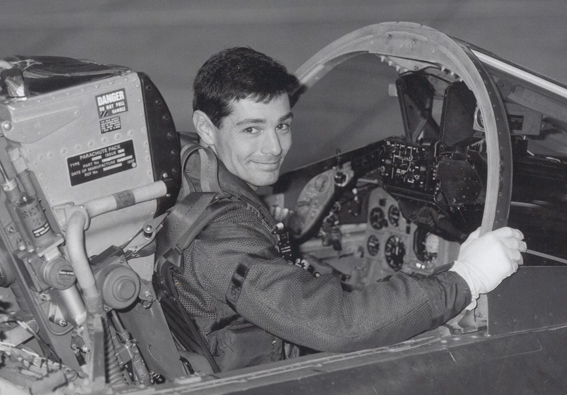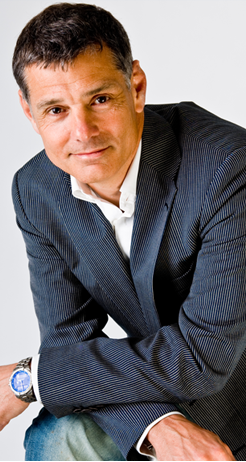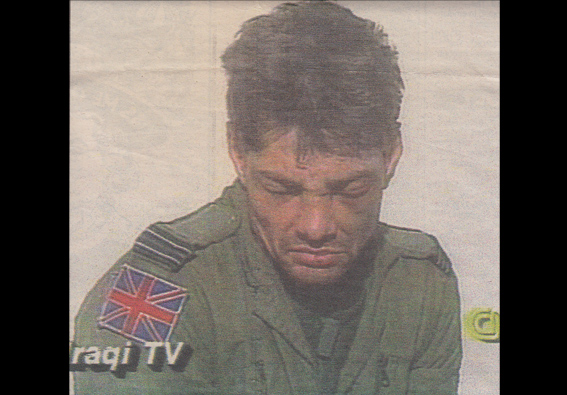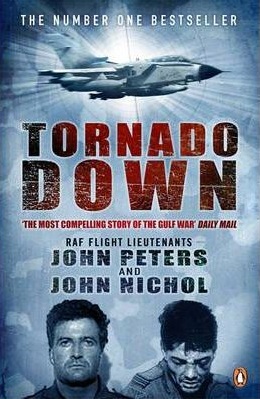Pursuit: Former fast-jet pilot, Gulf War POW, author and speaker.
Definition of success: “Contentment”. More below.
I’ve got to that point now with The Secrets of their Success that I don’t have to hound prospective guests into appearing. It was different starting out of course, but with the increasing public stature of each personality featured, so the next one is all the more agreeable to sharing their story. I’m not suggesting today’s guest was any less willing, but a schedule that had him running from one hemisphere to the other addressing audiences worldwide rather curtailed his availability. The truth is, I’ve been pursuing him and his story for months, and frankly, had the Queen been lined up on my guest list, I’d have continued to do so until – well, until he said yes. And that’s because, of all the success stories I’ve heard, the one of survival against the odds and subsequent regeneration was, until now, a box that needed ticking. If you’re over the age of thirty you’ll probably know him from those images that appeared on the news and the front pages of all the papers during the 1991 Gulf War. A bruised, beaten visage refusing to look the camera in the eye, defiant even then in the face of his captors and the threat of death and continued torture. But enough from me; while he has his feet firmly, if fleetingly, in one place, here to tell us how he went from pilot to POW to successful businessman, it is my privilege to introduce: John Peters.
“I followed a pretty standard, tried and tested route,” John begins, “to becoming an RAF fighter pilot: grammar school, university, officer and flying training. Then in 1991, when Kuwait was invaded by Saddam Hussein’s forces, my life took a left-turn! I was shot down on the first day of the Gulf War, 17th January 1991, and spent seven weeks as a prisoner of war. The first week was the most intense and my bruised and battered face was paraded on Iraqi State television. I was unaware the effect of that image would have on my life. After my release, I stayed in the RAF until 2000, but that experience sparked international interest and a speaking career. Besides corporate groups internationally, I have had the privilege of presenting in front of Her Majesty, The Queen and Prince Philip, Heads of State and even followed Mr Nelson Mandela on stage in South Africa. Along with John Nichol, my navigator, we wrote two best-selling books on his experiences; Tornado Down and Team Tornado, as well as a documentary, Tornado Down, which was Independent Documentary of the Year and a BAFTA Award Nominee. With that level of attention, it felt almost impossible to remain in the RAF, so I left in 2000 to start my own management consultancy business.”
Of course that’s why we’re here: to learn about John’s successful transition from pilot to businessman but…I’m not ready to move on from the flying bit yet. It took long enough to get this former fast-jet pilot in one place – I need to make the most of it.
“I do not come from a military nor flying family,” John explains which I ask what first got him into the cockpit, “but I always wanted to fly fast-jets ever since I can remember: my childhood dream was to be a fighter pilot. It was not just a job; it was who I wanted to be. When I was young, a pivotal book was Reach for the Sky, about the World War Two fighter ace, Douglas Bader. Through my school’s Combined Cadet Force, I was awarded a Flying Scholarship and by seventeen had both my flying licence and gliding licences – I did not learn to drive until I was twenty! I then achieved a Cadetship, which was a RAF sponsorship through university during which I flew on the University Air Squadron. During my RAF career, I flew Tornado GR1s based in Germany on XV and 31 Squadrons and then became an Instructor pilot. When I was promoted to Squadron Leader, my final role in the Ministry of Defence was responsible for programmes on performance, leadership, safety culture and human error in aviation. The themes of human and systemic error, learning from failure and performance mind-set and culture inspired me to use this organisational experience to found a management consultancy providing business critical development, consulting and coaching through a leadership lens. My business, Monkey Business, provides expertise on leadership, strategy, change and resilience for middle to senior business teams and individuals of blue chip, public sector and third sector organisations.”
It’s obvious that John’s military training laid some of the cornerstones of his later career in management consultancy, but specifically it was his time as a POW in war-torn Baghdad, I discover, that chiselled him into the businessman he is today.
“My motivation to move into leadership consultancy evolved from my POW experience. Of course, I had the standard leadership development through school such as prefect and then officer, flying and staff training. In the RAF, there are some stunningly strong, compelling, talented characters that I considered were the real leaders. For me, I felt I was easy going and not as resolute. But in captivity, I found that this was a strength. After the war, one of the other POWs, an American Marine Corp Colonel – so a lot higher rank than me – insisted that I had led other prisoners through captivity, particularly one night when we were bombed. He said that they had trusted and believed in me that they could get through – and yet I could do nothing. I was in a concrete box with a metal door unable to escape and having endured the same as them: systematic beatings, abuse, isolation, starvation and bombings. But I could affect nothing. And yet he said it was the way I talked under the door that they had trusted and believed in me that they could get through. I am very proud of that. But this experience started a stream of consciousness to explore leadership beyond what you do, to who you are. A state of being. We do not do leadership: we become or are a leader. It is a state of being.”
I’m interested in this concept of being a leader, rather than following a few ground rules and simply labelling yourself one. But I think to understand it better we need to get to know such an individual. With that in mind, I’m interested to know what it’s like to be John Peters; the day-to-day life.
“I do not have a typical day, but am lucky enough to enjoy a full life: business meetings in London; designing and running client workshops; coaching sessions; speaking at conferences worldwide and otherwise I am on a number of boards for charities and schools. I am currently writing a book on leadership and have designed a leadership psychometric around my theories, so that is taking a lot of my time. Other than that, I am currently training for the London Marathon to support KidsOut, of which I am a Patron. And both Helen, my wife, and I travel and party a lot! I do not know what I am going to be doing next week and then my diary changes: I love that!”
Justifiable, then, given his multi-faceted roles within the circles of success, that when I ask John what his proudest achievement is he is forced to group several under one umbrella.
“I suppose that I would be labelled as an achiever,” he decides. “Wanting to become a fighter pilot, one has to be single-minded, focused and driven to achieve and I am very fortunate to have fulfilled that childhood dream. I am proud of starting my own business and making a success of it, without any big corporate branding or funding other than my ideas and drive despite all the continued challenges and uncertainties that running a small business brings. But, in reality, I gain the most satisfaction from seeing the achievements of my children. Given a measure of self-centredness when I was younger, my joy on seeing them emerge as young adults provides me with the greatest sense of achievement. That together, Helen and I did something special and worthwhile in what they can contribute to the world. They reflect our best achievement. And I am proud of my relationship with Helen. She is my rock.”
John might have his priorities correctly aligned, but that doesn’t mean he isn’t a work-aholic.
“In reality, and it’s probably really bad, but all I do is work! But, that said, in running my own business I enjoy huge freedoms of choice (do I sack myself?) and can indulge myself without justification to a corporate HQ! I am spoilt by all the variety that I experience because of my business life: the travel, people I meet, parties and events I go to. I do not really separate the work/life balance. This is my life and I am trying to live it to the full. Is a business lunch or dinner work? No, not really: it is fun. Speaking on stage to a thousand people is not real work: it is a privilege and I get a buzz! And afterwards, you are never a stranger in a room: people are wonderful to you, it is hard to buy a drink and you are staying in a wonderful hotel. Speaking is a privilege. And, let’s be honest, it is very well paid. If ever you meet a whinging speaker: shoot them! It is not a real job. Because you have told your story, everyone tells you their stories, which are amazing. People are amazing. My work is people: helping them be more and do more. I love it.”
Not that John’s labour of love doesn’t come without sacrifice.
“Sacrifices are sleep: I need to have more sleep! I wish I could say that I can survive consistently off four hours a night, but no super-human qualities there – I need eight hours. And Helen and I could spend more time together, but her life is similar to mine so that is why holidays are precious to us. That is where the balance has to come in: it is understanding each other’s choices so we can enjoy our life/lives together. But real sacrifices: no. They are sacrifices we choose to make. So revising for exams, spending hours learning, writing and work may not be my most favourite thing at times, but one needs to put the preparation to have the life one chooses. And we are spoilt for choice.”
Not surprising, then, that John harbours no envy of those who choose a more routine vocation.
“Absolutely not,” he affirms. “I get bored very easily, so I need variety and no routine.”

Despite achieving so much, John has a profoundly simple definition of the concept of success.
“Success and failure are just interpretative,” he points out. “Two sides of any action or choice. Some may view my choices of flying military aircraft as abhorrent, others a life achievement. Contentment is what I would view as success. It was late at night, having a whiskey with my Dad, post the Gulf War. At that time, I had just returned from flying two weeks in Southern Oman over the most amazing desert and mountains doing the job I loved and come back via my base in Germany to do a media/TV show in Amsterdam, onwards to London to a function where I was meeting Princess Diana, to return to Germany on the Sunday evening. At the same time, we had just published our book and I had a big fat cheque sent me. So there I am, after a life-threatening/life-changing experience being presented with money and fame. So did I feel successful? I had, and still do, a gnawing sense that I could be more. And my father, for all me questioning his life decisions and wanting different choices for him, reflected how lucky he is to have his life: my mum and his kids, and that he was content. That word, ‘content’, just hit me and remains with me. Content does not mean giving up on challenging yourself or your life; it means being content with yourself. At that time, I realised that this was a wisdom I have yet to gain. He had a wisdom I have yet to learn. To be content with yourself, whatever others believe; whatever talents, attributes or qualities we perceive we may or may not have or whatever circumstances or opportunities we perceive present themselves, to my way of thinking true success for all of us is to ultimately be content with oneself. It is too easy to compare to those who we perceive as successful: God gave them looks, brains or more than us. But if we can find contentment in our self, whatever life choices we make, however we may be judged by others, then to my mind that is success. True success is self-defined, not just recognition.”
It’s time to ask John’s advice to us, and I’m aware that perhaps we’ll get a professional response, given that the whole motivational speaking thing is this man’s mien. But in my research I watched a video of John speaking to an audience in Australia, and what stood out was that just because he gets paid to do it, doesn’t mean the wisdom he imparts isn’t genuine. He simply tells his story – emotively, yes, but also with candour. In any case, what he tells me is different to anything I’ve found researching John Peters so this, readers, is just for you:
“I would say find three things: context, confidence and contribution. First, find the right context: something that you truly love to do and that you do not view as work. The art is to find a life/people/organisation that values the attributes that you have naturally. Then it is easy, both because your chosen life matches your talents and, if you love it, it is not work. And hard work is the key to any success. No real success ever comes easy…unless you love the work. I am so lucky to have achieved my childhood dreams…I always wanted to fly jets and, although it was tough, it was that desire to be a pilot that overcame any challenges I encountered. Second, the key is confidence. And it is confidence to learn from failures. People think that I should be damaged from the Gulf, but I have never suffered any flashback or nightmare, no PTSD. It is what it is. Others perceive damage; the reality is opportunity. Do you know how much confidence an experience like this gives you? After that, what is worse? It gives you huge confidence. I had set my mind that I would get through it on the way to Baghdad and they did not get inside my head. I am far more confident because of the experience. So learning from our failures gives confidence not to be afraid of failure. The confidence gained means that you are prepared to step beyond your limits, because failure does not frighten you: it is just another action to learn from on the way to your life-choices. The final advice would be contribution. Be a giver, not a taker. Contribute to others, to life, to community. Do not be a taker. If you have a natural talent, share it. Do not just take from others; give something back. Leave the world a better place for you having been there. For all the gifts my life has brought me, I want to feel that in some way I contributed to those who have shared their lives with me. That I have contributed to the world.”
And that, I believe, makes two boxes ticked with one interview.
My thanks to John Peters for his time and for so candidly sharing his story with us. My apologies, also, for refusing to let him get away with not being a guest here! If you would like to see more of what John’s business involves have a look at www.monkeybiz.org and for more on his incredible story go to www.johnpeters.org. Also, there’s a great example of John speaking here.
Finally, it’s been nearly twenty years since I read Tornado Down, the gripping and emotional account of John’s capture in the Gulf War, but I’m about to revisit it. If you haven’t read it yet, you must, and it’s available at the link below:




2 Comments
Sally Cronin
Bravo, another excellent interview and it would be a privilege to attend one of John Peter’s talks. I am sure that whatever age you are, there is still time to achieve some dreams and ‘contentment’.
admin
Eye-opening, isn’t it? I like the way he puts it, that contentment doesn’t mean sitting back and resting on your laurels, but accepting where you are and where you’re heading.